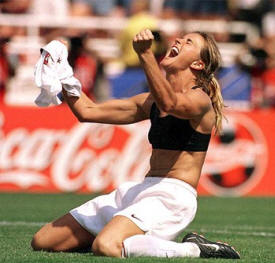Olympian speaks on living with rheumatoid arthritis

Olympic gold medalist Joy Fawcett hasn't let her rheumatoid arthritis slow her down. She runs and coaches soccer.Joy Fawcett Soccer player is active because of medication and early detection.
BY COURTNEY PERKES

Two years after Joy Fawcett was diagnosed with rheumatoid arthritis, she played in the 2004 Olympics, winning a Gold Medal, and then retired from competitive soccer. But in spite of the autoimmune disorder that can destroy joints and cause pain and fatigue, Fawcett still plays and coaches soccer.
The Orange County athlete also is speaking out about her condition on behalf of Generations, a Web site with information on the disease and survey results from a new poll of rheumatoid arthritis patients. The Web site and surveys were funded by Centocor, a pharmaceutical company that makes drugs to treat rheumatoid arthritis.
According to the survey of 1,000 patients, 2 out of 3 believed friends and family underestimated the impact of the disease and 90 percent said their disease interfered with their ability to work.
Fawcett, 40, is married with three daughters and lives in Rancho Santa Margarita.
Q. Why isn't there much awareness about rheumatoid arthritis?
A. A lot of people don't like to talk about it. A lot of the public, they'll assume it's like osteoarthritis, which is different. That's just wear and tear. This is an autoimmune arthritis and it hits harder. There's a lot of fatigue as well. The body is attacking the joints. If you don't catch it early, they disintegrate in a sense. Early treatment is important. The medication stops the progression from happening.
Q. What did you identify with from the survey results?
A. A lot of the day to day stuff. When you're having one of your bad days, it's hard. I remember not being able to get out of my clothes after I went running. It's depressing and frustrating when you can't do daily things. Your joints are so painful you can't do the normal things. Both my wrists hurt so bad I couldn't pull my shirt off. Or my fingers were so swollen I couldn't braid my daughter's hair. Those little things are hard, that people don't understand or see. I have to ask my kids to open bottles of water or whatever.
Q. Were you diagnosed early?
A. I was. It was 2002 before the 2003 World cup and 2004 Olympics. My hands were just really swollen. They were like sausages and it wouldn't go down. It stayed for weeks. You couldn't attribute it to anything. I didn't get hurt; it's not like I played goal keeper. I was more tired than usual. I remember at halftime sticking them in ice. It progresses from there. My wrists got so bad I couldn't move them. The doctors with the team said you should see a rheumatologist. Once you start the treatment, it helps a lot. You really notice the difference. I don't have any joint damage so far.
Q. What is your involvement with soccer these days?A. My husband and I started up a club called Saddleback United. We have nine girls' teams. We started it a year ago. My daughter, who is 14, started playing club and we were looking for a place for her to play. We couldn't find a fit so we figured we'd start one. It's focused on positive coaching; being more encouraging and positive. It's a challenge but it's fun.
Q. How do you stay active in spite of your condition?
A. I run every day. I still play soccer. I play on a coed team once a week. I coach a bunch of teams. If you're not taking care of yourself or getting a good night's sleep, it definitely takes a toll on your body. You'll definitely have episodes where you have more pain than usual.
Q. How closely are you following the Olympic trials?
A. I've watched gymnastics and I always love to watch that. Soccer had a game on Sunday. That's about all I've had time for. I'm looking forward to having time to watch it in August. I love just to be able to watch all of it.
Q. What have you thought of the scrutiny over swimmer Dara Torres?
A. I just think older people are able to do more. With technology and the medical field and keeping people healthy, I think they're just going to be able to play longer. They test you pretty well (for drug use) and they're on top of you all the time. From my own experience, they'd show up at random times at your house, restaurants.
Sesame seed oil and bigger breast
Links
- Home
- FAQ
- CONTACT SERVICES
- IVIG
- Healthy Oils
- Curry Powder
- Small Fiber neuropathy
- neurological effects of CIDP
- Feet Home
- Chronic fatigue syndrome
- Osteoporosis
- Women Heart Attacks
- Breast Size & Disease
- Female Sex Disease
- PARKINSON
- Memory problems
- Breast Lymph Drainage
- Kidney stone Buster
- Bras cause breast cancer
- Skin repair Clinic
- Pandas
- Hepatitis
- Weakness